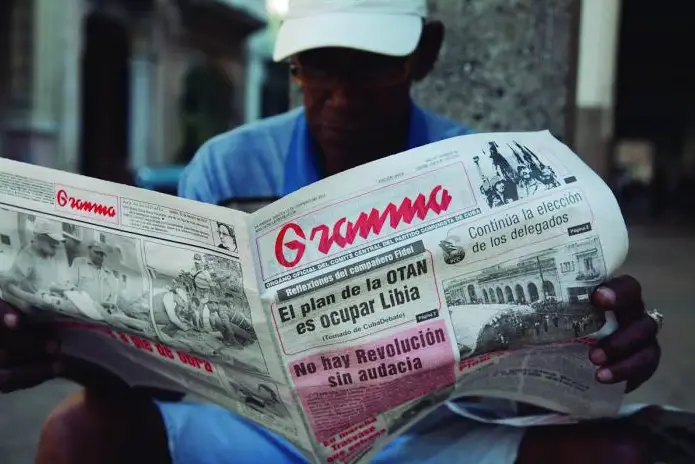Journalism, as a fluid and plural social institution, influences political dynamics regardless of the regime. Reflecting on U.S. mainstream journalism, scholar and journalist Yascha Mounk warns about the dangers of partisan information and replacing objectivity with a certain “moral clarity” tied to democratic activism. According to Mounk, true journalism must ask hard questions without fear or bias; only then can public trust be restored and distortions from elites avoided. Recent U.S. elections validate his concerns. In liberal democracies, the quality, plurality, and verifiability of public information, alongside freedoms of information and expression, are essential components of governance.
In autocratic, authoritarian, or totalitarian regimes, where power is assumed as a staging, information ceases to be a public good and becomes an exercise for manipulative communication. Information, monopolized by the state, serves to reinforce ideological narratives, marginalize dissenting voices, and limit citizens’ ability to envision alternative political futures. In such contexts, media are more constitutive than instrumental, actively shaping political dynamics. Today’s Cuba, as a totalitarian autocracy, reflects this tension between maintaining and eroding order amid uncertainty.
The relationship between the press, the state, and the public has evolved significantly in Cuba. State media, institutionalized in 1975 in a Leninist model, were defined as “important instruments of the ideological and political struggle, organs of the Cuban Communist Party (PCC) and the state for educating, informing, orienting, organizing, and mobilizing.” To legitimize its role, Cuban state print media have relied on history to create a unifying narrative—synchronically among contemporaries and diachronically across generations. This narrative has set parameters for identifying the “good Cuban,” while fluctuating processes of inclusion and exclusion shape the symbolic boundaries of Cuban identity in service to the achievement of a “revolutionary and socialist victory”.
However, excessive ideological regulation by the PCC and journalists’ self-regulation failures have fostered survival strategies like discretion and secrecy to avoid sanctions. Combined with a problematic reliance on state and PCC officials as sources, journalism has been reduced to little more than ideological spokespersonship, regurgitating official statements.
This disconnect between official themes (ideological hyperreality) and public interest topics (everyday reality) erodes trust in state media, prompting audiences to seek alternative interpretations of social realities. Consequently, the bureaucratic and restrictive model of state journalism, coupled with growing precarity and deprofessionalization, fails to offer incentives for young journalists to pursue the profession.
Moreover, the increasing complexity of Cuban society and the liberalization of internet access since 2008, have reshaped the rigid public sphere into multiple arenas for internal debate and a contentious transnational space autonomous from official politics. These spaces have begun addressing topics excluded from official media agendas, sparking debate among segments of Cuban society and its diaspora and threatening the state’s ideological hegemony.
A central player in this process is digital independent media. Over the past decade, these outlets have offered alternative perspectives on Cuban reality, despite technological restrictions, high access costs, legal uncertainty, and political polarization.
This independent digital press—stigmatized by the official discourse as a blueprint for “political-ideological subversion”, oriented and financed by the U.S. government—is a different and innovative proposal. However, it is heterogeneous in terms of objectives, styles and news quality. These media outlets range from intra-system revolutionary criticism (e.g., Joven Cuba, Revista Temas) to opposition generalist journalism (14yMedio, Diario de Cuba, ADN Cuba, Cubanet), specialized journalism (El Toque, Periodismo de Barrio, Cubalex), feminist platforms (Alas Tensas, Yo Sí Te Creo), critical think tanks (CubaXCuba, Cuba Próxima), narrative journalism (El Estornudo, Hypermedia Magazine), and investigative and data-driven journalism (CubaData, Proyecto Inventario, Yucabyte). Additionally, a growing number of influencers on social media enrich this contentious transnational space.
The contribution of data-driven investigative journalism in autocracies is particularly significant. By leveraging the speed, versatility, and reach of social media to collect and statistically analyze opinions from anonymous social sectors, these outlets amplify the voices of true political subjects and expose the regime’s oppressive nature. This data should inform academic research, helping to refine theories, develop new conceptual approaches, and provide students with innovative cognitive frameworks.
Independent digital media play a vital role in reevaluating journalism as a profession and redefining its public role under new digital circumstances. These outlets prioritize producing quality information for audiences interested in political deliberation and participation. Grounded in liberal values like autonomy and balanced reporting, they address contentious topics such as ecology, feminism, and minority rights—absent from official agendas—while fueling public deliberation and pressuring the government.
However, connections to foreign funding, particularly from the U.S., intensify their portrayal in official discourse as internal enemies and subjects of continuous public threats, censorship, and repression. In response to the spontaneous protests of July 11, 2021, state surveillance, censorship, and digital repression have escalated. Tactics include interrogations, asset confiscation, public “confessions,” blackmail, extortion, and forced exile—all aimed at discrediting independent media and sustaining the official narrative of mercenarism.
Despite these challenges, independent digital journalism has transformed Cuba’s communication landscape. In closed regimes dominated by state or ideological monopolies over public life, mechanisms for organization and social actors’ autonomous mobilization are neutralized, and the notion of public sphere is effectively perverted by the state. This process of nationalization of public spaces erodes the essence of politics, reducing individuals to unreflective automatons driven by preordained discourses and rituals.
Among other ritualistic mechanisms, state media tends to construct an ideological hyperreality that denies the foundations of information: factuality and truthfulness. Here, independent journalism disrupts the state’s monopoly on (mis)information, activating the dynamic components of social reality, especially the subjective dimension of politics.
To counter the ideological rigidity of state mechanisms, innovative narrative styles rooted in metaphor, concept, and data must emerge. Only then can segments of society reengage with issues of shared significance, and the individual reclaim its role as agent of politics, embracing diversity and plurality as essential to social life.
*Machine translation proofread by Ricardo Aceves.













